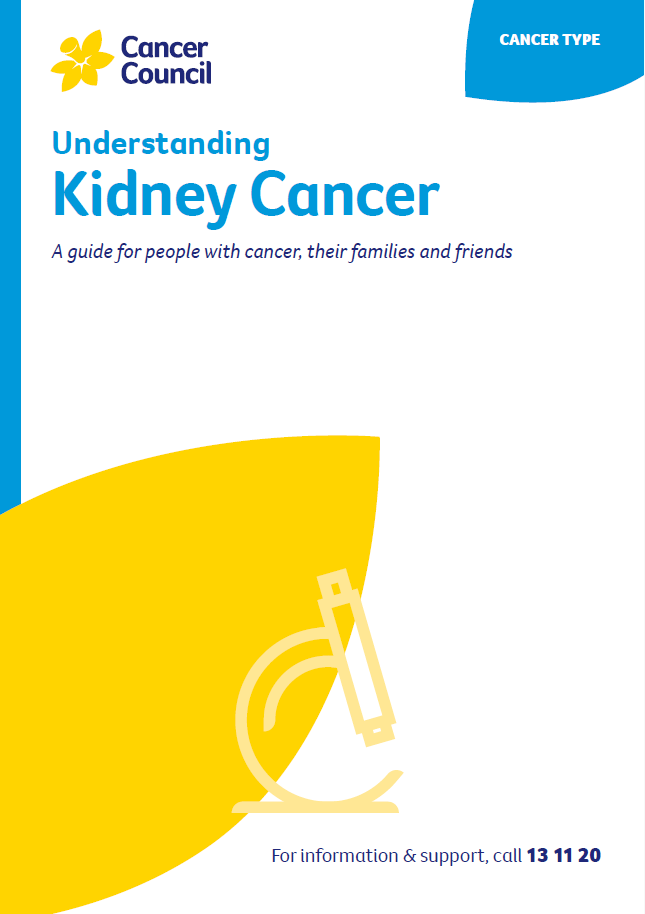- Home
- Kidney cancer
- Treatment for advanced kidney cancer
Treatment for advanced kidney cancer
Discover treatment options for advanced kidney cancer. Learn about surgery, systemic treatments, and managing symptoms.
Learn more about:
- Overview
- Treatment options
- Active surveillance
- Having drug therapies
- Targeted therapy
- Immunotherapy
- Radiation therapy
- Surgery
- Palliative treatment
Overview
When kidney cancer has invaded the major kidney veins or spread to nearby lymph nodes (stage 3 or locally advanced), you may still be able to have surgery to remove the tumour.
If kidney cancer has spread outside the kidney to other parts of the body (stage 4 or metastatic), treatment usually aims to slow the spread of the cancer and to manage any symptoms.
Treatment options
A combination of different treatments may be recommended. Which combination is suitable for you will depend on several things, including how soon after diagnosis you start systemic treatment, as well as your blood counts, blood calcium levels and general health.
Active surveillance
In some cases, kidney cancer grows so slowly that it won’t cause any problems for a long time. Because of this, especially if the advanced kidney cancer has been found unexpectedly, your doctor may suggest looking at the cancer regularly, usually with CT scans. This approach is known as active surveillance.
If the cancer starts to grow quickly or cause symptoms, your doctor may recommend active treatment.
Speaking to a counsellor about your feelings and individual situation can be helpful. You can also call Cancer Council 13 11 20 to talk to a health professional about your concerns.
Having drug therapies
Drugs can reach cancer cells throughout the body. This is called systemic treatment.
Controlling kidney cancerTargeted therapy and immunotherapy are the main types of systemic treatment used to control advanced kidney cancer. Chemotherapy is rarely used for kidney cancer these days. The types of drugs and combinations used are rapidly changing as clinical trials show better responses and improved survival with newer drugs. | |
 | Accessing new drugsTalk with your doctor about the latest developments and whether you are a suitable candidate. You may also be able to get other drugs through clinical trials. |
Cost of drugsThe Pharmaceutical Benefits Scheme (PBS) subsidises the cost of some targeted therapy or immunotherapy drugs as long as certain criteria are met. Medicines or treatments that are not on the PBS are usually very expensive unless given as part of a clinical trial. | |
Reporting side effectsYour doctors will explain the possible side effects of the different drugs. It is important to tell your treatment team about any side effects you have from drug therapies. Side effects can be better managed when they are reported early. If left untreated, some can become life-threatening. |
→ READ MORE: Targeted therapy for advanced kidney cancer
Podcast: Treatment Options for Advanced Cancer
Listen to more of our podcast for people affected by advanced cancer
More resources
Dr Alarick Picardo, Urologist, Fiona Stanley Hospital, WA (clinical review); Heidi Castleden, Consumer; Donna Clifford, Urology Nurse Practitioner, Royal Adelaide Hospital, SA; Prof Paul De Souza, Medical Oncologist and Professor of Medicine, Nepean Cancer Care Centre, The University of Sydney, NSW; Mike Kingsley, Consumer; Prof Declan Murphy, Urologist and Director of Genitourinary Oncology, Peter MacCallum Cancer Centre, VIC; Caitriona Nienaber, 13 11 20 Consultant, Cancer Council WA; Luke O’Connor, Urology Nurse, Royal Brisbane and Women’s Hospital, QLD; A/Prof Shankar Siva, Radiation Oncologist and Cancer Council Victoria Colebatch Fellow, Peter MacCallum Cancer Centre, VIC; A/Prof Homi Zargar, Uro-Oncologist and Robotic Surgeon, Western Health and Royal Melbourne Hospital, VIC.
View the Cancer Council NSW editorial policy.
View all publications or call 13 11 20 for free printed copies.

